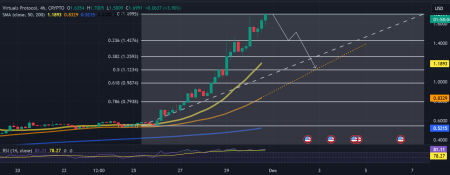
Key Takeaways:
- JD.com’s stablecoin is in Phase 2 of Hong Kong’s sandbox testing.
- The token is pegged to fiat currencies and built for cross-border and retail transactions.
- JD Chain CEO Liu Peng warned against unauthorized purchase offers during the test period.
JD.com is moving forward with the rollout of its blockchain-based stablecoin, which is currently undergoing the second phase of sandbox testing in Hong Kong, according to a report published by Guandian on May 30.
The update was shared by Liu Peng, CEO of JD Chain, stating that the token is pegged 1:1 to fiat currencies like the Hong Kong dollar and the U.S. dollar.
JD.com Prepares Official Stablecoin Launch
The stablecoin is built on a public blockchain infrastructure and is intended to support cross-border payments, enterprise settlement, and everyday retail use. Liu said it will be available for broader use after completing the sandbox program.
“We hope this project contributes to payment efficiency not only within JD’s ecosystem but also for businesses and individuals worldwide,” Liu said.
The initiative has been accepted into Hong Kong’s stablecoin issuer sandbox following a year of preparation. JD.com cited the regulatory environment and government support for digital assets as key reasons for launching the project in the city.
The company said it is prioritizing compliance and infrastructure readiness before releasing the stablecoin to the public. Liu warned that any unofficial purchase offers currently circulating are unauthorized.
The project showcases JD.com’s strategy to enhance its cross-border transaction systems and expand its role in global commerce through blockchain tools.
Hong Kong’s Sandbox Attracts Mainland Firms
JD.com is one of China’s largest e-commerce and logistics firms. It operates across retail, supply chain, and fintech segments. JD Chain is its dedicated blockchain unit, focusing on developing digital infrastructure for enterprise applications, including payments, asset management, and smart contracts.
While crypto trading remains banned in mainland China, Hong Kong operates under a separate regulatory system that permits controlled digital asset pilots.
JD Chain’s sandbox participation is legally viable under this structure, allowing the company to test blockchain-based payments without violating national policy.
The Hong Kong Monetary Authority has been active in stablecoin oversight, backing sandbox trials and CBDC pilots for cross-border use. JD.com’s stablecoin joins a wave of enterprise-led experiments exploring legal frameworks for tokenized payments in the region.
The move could indicate a trend among major Chinese firms toward blockchain infrastructure. Though speculative crypto remains restricted, state guidance has supported applications focused on payments, logistics, and compliance.
Frequently Asked Questions (FAQ)
Using a public blockchain allows greater transparency and potential interoperability with other systems, which could make the stablecoin more versatile in global transactions.
JD.com’s pilot could open a pathway for state-aligned companies to explore blockchain payments through Hong Kong. This model provides legal cover while allowing firms to collect real-world data, which could influence future policy directions in mainland China.
Rather than a policy shift, it represents a tactical use of regulatory segmentation.





